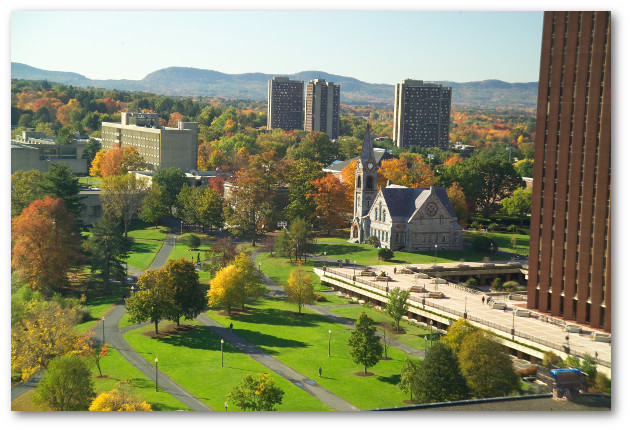The University of Massachusetts Amherst

The University of Massachusetts Amherst is the flagship campus of the Commonwealth’s university system. There are three other campuses that offer undergraduate and graduate programs at Boston, Dartmouth, and Lowell. The University’s Worcester Medical School includes the medical school and associated teaching hospital.
One of today’s leading centers of public higher education in the Northeast, the University of Massachusetts Amherst was established in 1863 under the original Land Grant Act. In recent decades it has achieved a growing reputation for excellence in an increasing number of disciplines, for the breadth of its academic offerings, and for the expansion of its historic roles in education, research, and outreach. A large number of faculty, especially in the physical sciences and engineering, actively engage in sponsored activities. Research expenditures in the past year totaled more than $195 million.
Within its nine schools and colleges the university offers bachelor’s degrees in 111 areas, master’s degrees in 78, and the doctorate in 48. Almost ninety-five percent of the approximately 1,400 full-time faculty hold the highest degree in their fields. There are approximately 30,000 students, made up of over 23,000 undergraduates and almost 7,000 graduates, including part-time. The university prides itself on the diversity of its student body, and is committed to the principles of affirmative action, civility, equal opportunity, and the free exchange of ideas.
Located in the historic Pioneer Valley of Western Massachusetts, the 1,450-acre campus provides a rich cultural environment in a rural setting. The university is one of the founding members of the Five College cooperative program, offering reciprocal student access among the University, and Amherst, Hampshire, Mount Holyoke and Smith colleges. The recent purchase of the former 64-acre campus of Mount Ida College located in Newton, Massachusetts, now provides a Boston-area center for student experiential learning opportunities and industry collaboration for several graduate programs.
The Graduate Dean, in collaboration with the University Graduate Council, exercises overall review and supervision of graduate programs conducted in the several colleges and provides guidance in the development of new programs as well as the maintenance of standards for existing programs. Each college of the university has developed its graduate programs in accordance with the highest national professional standards of the respective fields.
See below for additional information on the University of Massachusetts and its graduate programs:

